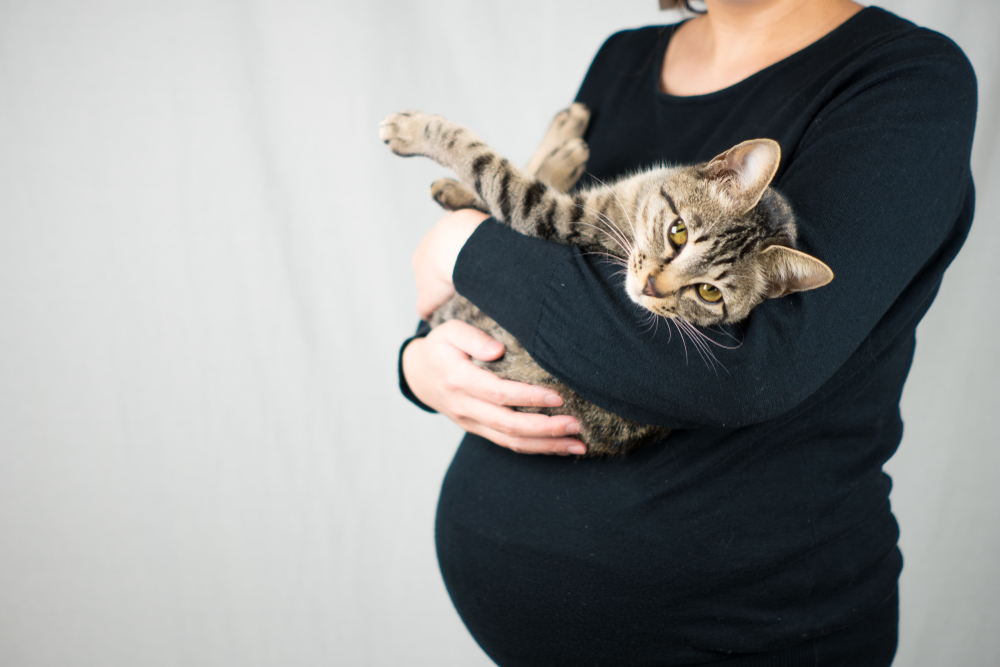Like all major life changes, pregnancy has its pitfalls as well as its bright spots. Weight gain, stretch marks, lower back pain, and sciatica are all part of the uncomfortable reality of pregnancy faced by many. But there are plenty of positives, too. In addition to the excitement of welcoming your new baby, pregnancy means you get to skip period cramps for nine months. But did you know you probably shouldn’t be handling the kitty litter box while pregnant? We’ll give you the full scoop on the potential dangers of dealing with litter boxes while pregnant, and we’ll teach you how to safely change the kitty litter box if you absolutely have to.

Why is changing kitty litter dangerous during pregnancy?
Sharing your home with a cat isn’t risk free. Allergy and asthma sufferers may experience an increase in symptoms. Adopting a new fur baby may lead to a flea infestation. Scratches and bites can become infected, sometimes causing cat-scratch fever, also known as cat-scratch disease or CSD. When you’re pregnant, however, the main risk posed by your beloved fur baby actually lurks in the litter box.
Toxoplasmosis, which is caused by the parasite Toxoplasma gondii, also known as T. gondii, is typically spread through contact with cat feces. Changing your cat’s litter box, coming into contact with soiled grass if your cat defecates outdoors, eating some types of cured meats or unpasteurized dairy products, or consuming undercooked meat can all result in this parasitic infection. In most cases, toxoplasmosis doesn’t cause any symptoms, but it can cause adults to feel like they have the flu. Contact your doctor immediately if you experience fever, muscle aches, swollen lymph nodes, or a sore throat, and you’ve done any of the following during pregnancy:
- handled a cat’s litter box
- spent time in a garden
- eaten undercooked meat
- eaten unwashed fruits and vegetables, including salad
- consumed unpasteurized dairy products
Toxoplasmosis and pregnancy
The CDC estimates that as much as 15% of the U.S. population aged 12 and up have had toxoplasmosis, granting a natural immunity against future infections. But if you’ve never had toxoplasmosis and lack immunity, contracting this parasitic infection during pregnancy can have heartbreaking consequences. Toxoplasmosis can cause preterm birth, miscarriage, and even stillbirth. If you’re infected with toxoplasmosis during the third trimester, your baby has an 80 percent chance of being born with an active infection, putting them at risk of eye damage, hearing loss, jaundice, or an enlarged liver or spleen.

Will I have to get rid of my cat?
Pregnant cat parents are frequently cautioned by well-meaning individuals to rehome their cats. While toxoplasmosis is frightening, the good news is that you don’t need to get rid of your fur baby during pregnancy. If you’ve had cats your entire life, there’s a chance you’ve already had toxoplasmosis and might be immune. Toxoplasmosis screenings are rarely performed during pregnancy, but you can ask your doctor to check for antibodies if you think you may have had toxoplasmosis in the past or if you think you’ve recently been exposed.
Living with a cat while pregnant
Your cat is part of your family, and you don’t want to give up your fur baby simply because you’re pregnant. Fortunately, you don’t have to. However, there are a few things you can do to reduce your risk of contracting toxoplasmosis during pregnancy. Here are a few helpful tips:
- Ask a friend, partner, or other family member to change your kitty litter box every day. It takes between one to five days for the parasite shed by fecal matter to become infectious.
- If you have to change the litter box by yourself, wear a pair of disposable gloves while handling the litter, and make sure you wash your hands thoroughly with soap and water afterward.
- Always wear gloves when working outdoors and gardening; wash your hands as soon as you’ve finished for the day.
- Don’t eat raw or undercooked meats during pregnancy, as roughly half of all toxoplasmosis infections are caused by undercooked meats.
- Avoid unpasteurized milk products, such as certain yogurts, soft cheeses, and ice cream made with unpasteurized (sometimes called “raw”) milk.
- Thoroughly wash all fruits and vegetables before consumption, including pre-washed fruits, veggies, and salad kits.

Avoiding toxoplasmosis during pregnancy doesn’t have to be difficult. Try to avoid changing the cat litter box, wear gloves when gardening, and avoid undercooked meat and unwashed produce. With a few precautions and a bit of help around the house, you can reduce your chances of contracting toxoplasmosis to almost zero and still keep your furry best buddy as part of your growing family.



